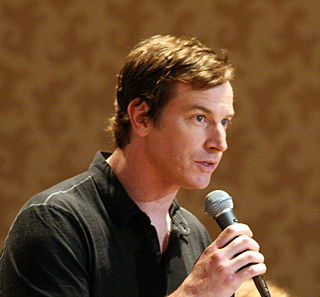A Quote by Tobias Wolff
One of the things that draws writers to writing is that they can get things right that they got wrong in real life by writing about them.
Related Quotes
Writing objects to the lie that life is small. Writing is a cell of energy. Writing defines itself. Writing draws its viewer in for longer than an instant. Writing exhibits boldness. Writing restores power to exalt, unnerve, shock, and transform us. Writing does not imitate life, it anticipates life.
I love the resource of the Internet. I use it all the time. Anything I'm writing - for example, if I'm writing a scene about Washington D.C. and I want to know where this monument is, I can find it right away, I can get a picture of the monument, it just makes your life so much easier, especially if you're writing fiction. You can check stuff so much quicker, and I think that's all great for writers.
If a writer of prose knows enough about what he is writing about he may omit things that he knows and the reader, if the writer is writing truly enough, will have a feeling of those things as strongly as though the writer had stated them. The dignity of movement of an iceberg is due to only one-eighth of it being above water. A writer who omits things because he does not know them only makes hollow places in his writing.
Whatever I am, I'm not as bad as the person that read the novel before watching the film. I'll enjoy whatever they [producers] are putting in front of me. If they made an attempt to get things right, then I'll criticize them for what they got wrong. If they made no attempt to get things right, and yet they stumble on something that's right, I'll comment on what they got right.
Writing has to do with truth-telling. When you're writing, let's say, an essay for a magazine, you try to tell the truth at every moment. You do your best to quote people accurately and get everything right. Writing a novel is a break from that: freedom. When you're writing a novel, you are in charge; you can beef things up.
The cool thing about 'Transparent' is that the show is funny but not like a sitcom is funny. It all comes down to the writing... The writers on that show are so good that you don't have to worry about anything. There are so many things that can go wrong making a TV show or a movie, but if the writing's good, that's, like, 95 percent of it.
Academic writing you have to get right. Fiction you have to get plausible. And there's a world of difference. In a way, if someone says this didn't feel exactly right, I don't care. But that is not okay to do in academia - it's not about feeling. You want to establish a pretty solid case. So did this allow me to express things differently? Absolutely. Another thing I've been thinking about as an academic: our writing style is expository, and in fiction, withholding information matters quite a bit. Withholding things in academia - there's no place for that!





































